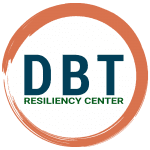INFORMATION ABOUT DBT
What is DBT?
Dialectical Behavior Therapy (DBT) is a cognitive behavioral treatment developed by Marsha Linehan, PhD, ABPP. It emphasizes individual psychotherapy and group skills training classes to help people learn and use new skills and strategies to develop a life that they experience as worth living. DBT skills include skills for mindfulness, emotion regulation, distress tolerance, and interpersonal effectiveness. Research has shown DBT to be effective in reducing suicidal behavior, non-suicidal self-injury, psychiatric hospitalization, treatment dropout, substance use, anger, and depression and improving social and global functioning.
DBT Has Been Shown in Clinical Studies to Effectively Treat:
Borderline personality disorder (BPD)
Post-traumatic stress disorder (PTSD)
Substance use disorder (SUD)
Attention deficit hyperactivity disorder (ADHD)
Major depression, including treatment-resistant depression (TRD)
Bipolar disorder
Suicidal and self-harming behavior
Pre-adolescent children with severe emotional and behavioral dysregulation
Binge eating disorder (BED)
Bulimia nervosa
Antisocial personality disorder (ASPD)
Histrionic personality disorder (HPD)
Narcissistic personality disorder (NPD)
How Does DBT Work?
The theory behind dialectical behavioral therapy is that some people are prone to react in a more intense and out-of-the-ordinary manner toward certain emotional situations, primarily those found in interpersonal (romantic, family, and friend) relationships. DBT theory suggests that some people’s arousal levels in such situations can increase far more quickly than the average person’s, attain a higher level of emotional stimulation, and take a significant amount of time to return to baseline arousal levels.
People who are sometimes diagnosed with borderline personality disorder experience extreme swings in their emotions, see the world in black-and-white shades, and seem to always be jumping from one crisis to another. Because few people understand such reactions — most of all their own family and a childhood that emphasized invalidation — they don’t have any methods for coping with these sudden, intense surges of emotion. DBT is a method for teaching skills that will help in this task.
The Four Skill Modules of DBT
Dialectical Behavioral Therapy (DBT) has show great effectiveness in treating post-traumatic stress disorder, mood disorders, personality disorders, and many other mental health conditions. DBT consists of four skill modules, each designed to help individuals better manage their behaviors, emotions, and thoughts.
MINDFULNESS
Helps individuals become more aware of their thoughts and urges by encouraging them to live in the present
DISTRESS TOLERANCE
Distress Tolerance teaches healthy coping skills to use in a crisis, when emotions are running high
EMOTION REGULATION
Emotion Regulation skills help individuals better understand the functions and effects of their feelings.
INTERPERSONAL EFFECTIVENESS
Emotion Regulation skills help individuals better understand the functions and effects of their feelings.
What does DBT treatment look like?
Individual weekly psychotherapy sessions that emphasize problem-solving behavior for the past week’s issues and troubles that arose in the person’s life. Self-injurious and suicidal behaviors take first priority, followed by behaviors that may interfere with the therapy process. Quality of life issues and working toward improving life in general may also be discussed. Individual sessions in DBT also focus on decreasing and dealing with post-traumatic stress responses (from previous trauma in the person’s life) and helping enhance their own self-respect and self-image. During individual therapy sessions, the therapist and client work toward learning and improving many basic social skills.
